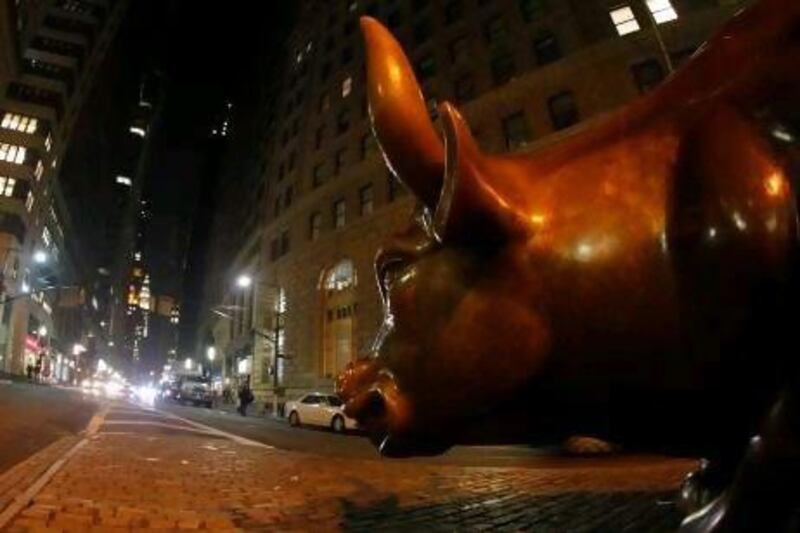Fund managers across the region are worried that impressive gains enjoyed by markets in the Middle East so far this year can be quickly reversed if global volatility persists.
Major stock markets in Europe, Asia and the United States have closed lower more often than they have closed higher in recent weeks on renewed fears about the euro-zone sovereign-debt crisis, ongoing concerns about a hard landing in China and mixed recovery signals from the US.
Since March 14, the Dow Jones Industrial Average is down 3.2 per cent, the Euro Stoxx 50 Index is down 9.22 per cent and Japan's Nikkei is down 6.17 per cent.
Stocks in the UAE and Saudi Arabia have the most to lose from the global uncertainty, because they have benefited from the biggest gains so far this year, local fund managers and analysts have said.
"In Saudi Arabia and the UAE, the correction may be sharper because they have gained more than 20 per cent this year. Other markets may hold on [to their gains]," said Kanaga Sundar, the head of research at Gulf Baader Capital Markets in Oman.
Optimism about the global recovery and demand has helped to rally global equities since the start of the year. In the US, the Dow Jones Industrial Average is up 4.81 per cent for the year so far.
The Euro Stoxx 50 Index is up 1.94 per cent. In Asia the Nikkei has gained 6.57 per cent, with the Hang Seng up 10.33 per cent.
But fears about a resurgence of debt trouble in Spain and concerns that the US recovery might be slowing have arrested that run in recent weeks.
Regional bourses have outstripped the performance of many of the more developed markets. The Dubai Financial Market General Index is up 23.54 per cent since January, the Abu Dhabi Securities Exchange General Index is up 5.4 per cent in the period, and the Saudi Tadawul All-Share Index has gained 18 per cent.
Local factors such as renewed confidence in the UAE property market have helped to boost gains.
Aabar Investments increasing its stake in Arabtec, a builder in Dubai, has sent Arabtec's stock up 116.98 per cent this year. Aabar is an investment vehicle owned by the Abu Dhabi Government.
A possible merger between the Abu Dhabi developers Aldar Properties and Sorouh Real Estate has pushed their stocks higher.
But there is concern that a prolonged reversal in the global trend could strip the gains made by regional markets.
"So far, the impact has been somewhat muted," said Haissam Arabi, the chief executive at Gulfmena Investments in Dubai.
A persistence of global market weaknesswould harm sentiment, he said.
"We're still confident we've entered a new cycle, but that could be impacted by heightened fear," Mr Arabi said.
Hisham Tuffaha, a fund manager at Bakheet Investment Group in Saudi Arabia, said bad news from outside the region had already been priced in on the Tadawul.
The Egyptian Exchange leads a cadre of strongly performing markets in the Middle East and North Africa, up 28.42 per cent this year.
However, Wafik Dawood, the head of institutional sales at Mega Investment Securities in Egypt, said Gulf economies and markets were more vulnerable to global influences than were post-revolution countries such as Egypt.
"In Egypt particularly, investors are already concerned by the political scene, they are not worried about what's happening in the global backdrop," he said.
Egypt continues to endure economic uncertainty as a result of persistent volatility in its domestic politics. The political divisions have extended to the question of whether the country should accept an IMF loan to shore up its weak finances.
twitter: Follow our breaking business news and retweet to your followers. Follow us





